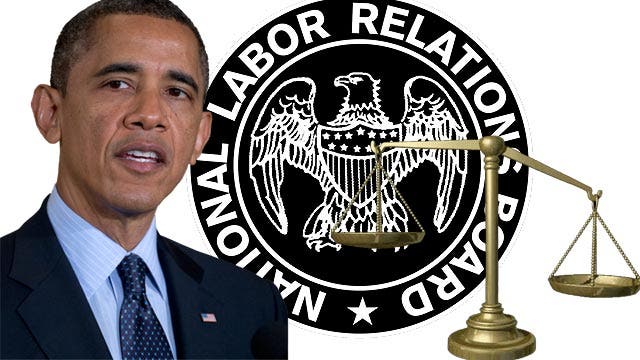Fed appeals court rules against Obama recess appointments
Says NLRB picks were unconstitutional
WASHINGTON – A federal court's ruling Friday that President Obama violated the Constitution with recess appointments to the National Labor Relations Board opened the door to claims that a host of rulings and other past appointments may be in question, as the White House blasted the decision as unfounded.
The administration is expected to appeal. Though White House Press Secretary Jay Carney would not confirm that, he called the ruling "novel and unprecedented."
"It contradicts 150 years of practice by Democratic and Republican administrations. So we respectfully but strongly disagree with the ruling," Carney said.
He denied that the ruling would have any bearing on other decisions and appointees. "This is one court, one case, one company," Carney stressed.
But Republican lawmakers who have railed against the administration's recess appointments, as well as the often union-favoring decisions of the NLRB, rejected that view.
"Today's ruling will certainly cause other opinions unconstitutionally issued by the board to be invalidated," Rep. Darrell Issa, R-Calif., said. "The unconstitutionally appointed members of the NLRB should do the right thing and step down."
He also urged the NLRB to take the "responsible course" and stop issuing decisions "until a constitutionally sound quorum can be established."
The quorum issue is critical, as the NLRB only has three members -- the typically five-member board is only allowed to issue decisions when it has at least three members. The court decision pertained to three separate appointees, two of whom are still on the board. If those two left, there would be just one validly appointed member -- effectively shutting the board down.
If the decision stands, it could also invalidate hundreds of board decisions made over the past year.
The ruling also threw into question Obama's recess appointment of Richard Cordray to head the Consumer Financial Protection Bureau. Cordray's appointment, made in early January along with the three NLRB appointments in question, has been challenged in a separate case.
"The recess appointments are invalid," C. Boyden Gray, former White House counsel to former President George H.W. Bush, said in a statement. He said the questions surrounding Cordray also cast "serious doubt" on the actions taken by the Consumer Financial Protection Bureau.
Carney and the NLRB claimed the case would not affect the board's operations.
NLRB Chairman Mark Gaston Pearce said the board "respectfully disagrees with today's decision and believes that the president's position in the matter will ultimately be upheld."
He said "we will continue to perform our statutory duties and issue decisions."
Carney also cited "280-plus intra-session recess appointments" dating back to 1867, suggesting the court ruling flies in the face of this history.
The suit had been brought by a local business in Washington state challenging the National Labor Relations Board. Supported by dozens of Senate Republicans, the case argued the president didn't have the power to make three appointments to the NLRB.
Attorneys for the Obama administration argued that he had the authority because the Senate was away for the holidays on a 20-day recess. The Constitution allows for such appointments without Senate approval when Congress is in recess.
But during that time, GOP lawmakers argued, the Senate technically had stayed in session because it was gaveled in and out every few days for so-called "pro forma" sessions.
GOP lawmakers used the tactic -- as Democrats had done in the past -- specifically to prevent the president from using his recess power to install members to the labor board. The White House argued that the pro forma sessions -- some lasting less than a minute -- were a sham.
But the three-judge panel for the Court of Appeals in the District of Columbia said the appointments were not valid. The judges, all appointed by Republican presidents, ruled that during one of those pro forma sessions on Jan. 3, the Senate officially convened its second session of the 112th Congress, as required by the Constitution.
"Either the Senate is in session, or it is in the recess. If it has broken for three days within an ongoing session, it is not in 'the Recess,'" the panel said.
The court said the president could only fill vacancies with the recess appointment procedure if the openings arise when the Senate is in an official recess, which it defined as the break between sessions of Congress.
"Considering the text, history and structure of the Constitution, these appointments were invalid from their inception," a panel said.
Republican lawmakers lauded the decision.
"Today's ruling reaffirms that the Constitution is above political party or agenda, despite what the Obama administration seems to think," Sen. Orrin Hatch, R-Utah, said. "With this ruling, the D.C. Circuit has soundly rejected the Obama administration's flimsy interpretation of the law, and will go a long way toward restoring the constitutional separation of powers."
In early January, Obama appointed Deputy Labor Secretary Sharon Block, union lawyer Richard Griffin and NLRB counsel Terence Flynn to fill vacancies on the NLRB, giving it a full contingent for the first time in more than a year. Block and Griffin are Democrats, while Flynn is a Republican. Flynn stepped down from the board last year.
The Associated Press contributed to this report.





